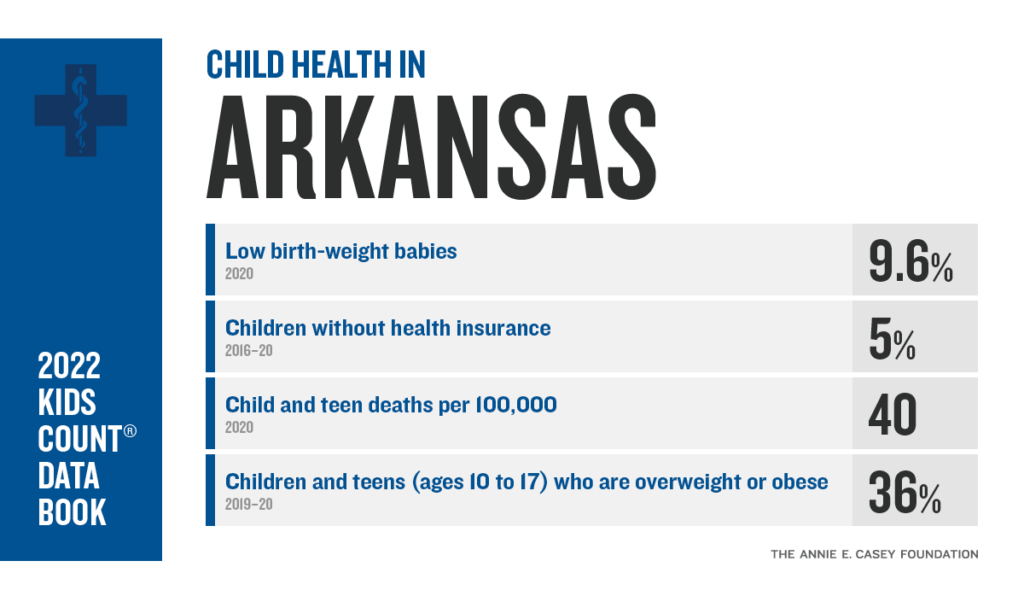
No Time like the Present
The Annie E. Casey Foundation’s 2022 KIDS COUNT® Data Book highlights worsened outcomes on several of the health indicators for children in Arkansas. Unfortunately, since 2019, the Arkansas rankings worsened for the percentage of children born with low birth weights, child and teen deaths, percentage of teens aged 10-17 who are overweight or obese, and uninsured children.

On the low birth-weight babies indicator, Arkansas ranks 44th out of the 50 states, down from 28th last year. From 2010-2019, there has been a 9% increase for the state in this category, and the current percentage of babies born with low birth weight in the state is 9.6%. This figure is higher than the national rate, 8.2%.
Between 2010 and 2020, our death rate among children ages 1-19 increased by 9%, an issue that Arkansas needs to be addressed. We currently rank 47th out of the 50 states for child and teen deaths. This year’s Data Book shows our death rate among children ages 1-19 in 2020 was 40 per 1,000 children, well above the national rate of 28 per 1,000.
Data on the percentage of our adolescents, teens aged 10-17, who are overweight or obese as defined by having a Body Mass Index (BMI) at or above the 85th percentile shows Arkansas currently ranks 40th. Arkansas’s ranking has continued to worsen from 2016-2017, where we ranked 23rd, 24th from 2017-2018, and increasing in 2018-2019 rank, to 36th. These increases signal concern for children’s physical health in the state. Obesity is a catalyst for additional health concerns that negatively impact children’s overall health and wellbeing. Children with obesity are more susceptible to high blood pressure, type 2 diabetes, breathing problems, joint problems, anxiety, depression, and low self-esteem. With both mental health and obesity on the rise in Arkansas, it’s important that we stay attuned to the potential for these health conditions to co-occur among the children in the state.
Although Arkansas’s ranking for uninsured children has worsened since last year, from 23rd to 24th, the good news is that the 2016-2020 percentage of uninsured children in the state has decreased from 7% to 5%, equal to the national uninsured children rate. There were 19,093 more insured children within the 2016-2020 timeframe in Arkansas, partially due to the federal funding that allowed Medicaid programs to provide continuous coverage to children and families throughout the pandemic.
With the pandemic still going on, and the continued effects that it has on the children in Arkansas, it’s time to create lasting solutions for the long-term benefit of our youth. We can continue to make positive gains in decreasing the number of uninsured children in the state through the adoption of continuous coverage for ARKids A, children in families with the lowest household incomes in the state. Providing continuous coverage to children within this Medicaid category will ensure medical access to safeguard against the potential effects of poverty.
The course forward should also focus on addressing negative birth outcomes by ensuring presumptive eligibility for pregnant mothers applying for Medicaid coverage. Presumptive eligibility is temporary coverage for those who have applied for Medicaid, and their application is pending. This will ensure that mothers will have access to medical care throughout their pregnancies to ensure the medical safety of themselves and their babies.
Although it is not covered in the Data Book, data shows firearms are now the leading cause of death among children and teens in the United States. Arkansas had the fifth-highest rate of firearm deaths per 100,000 children in 2020. We need to support policies that promote gun safety. We need to also focus on improving mental health policies to address the mental health crisis, including addressing suicide prevention and dedicating funding to support children as they seek out necessary services.
Finally, we need more education on childhood obesity, access to healthy foods, and further efforts made to decrease food insecurity and poverty. Lack of access to healthy foods and health care is a recipe for future diseases and health conditions as a child and as an adult. We need to ensure access to appropriate mental health services to address any mental health symptoms that may result from obesity. Arkansas still has a long way to go to get to number one in child health and well-being.
